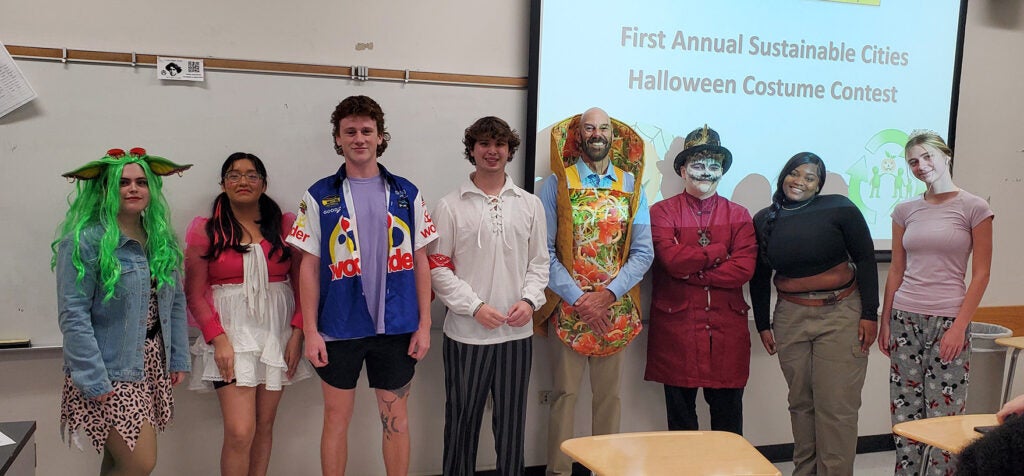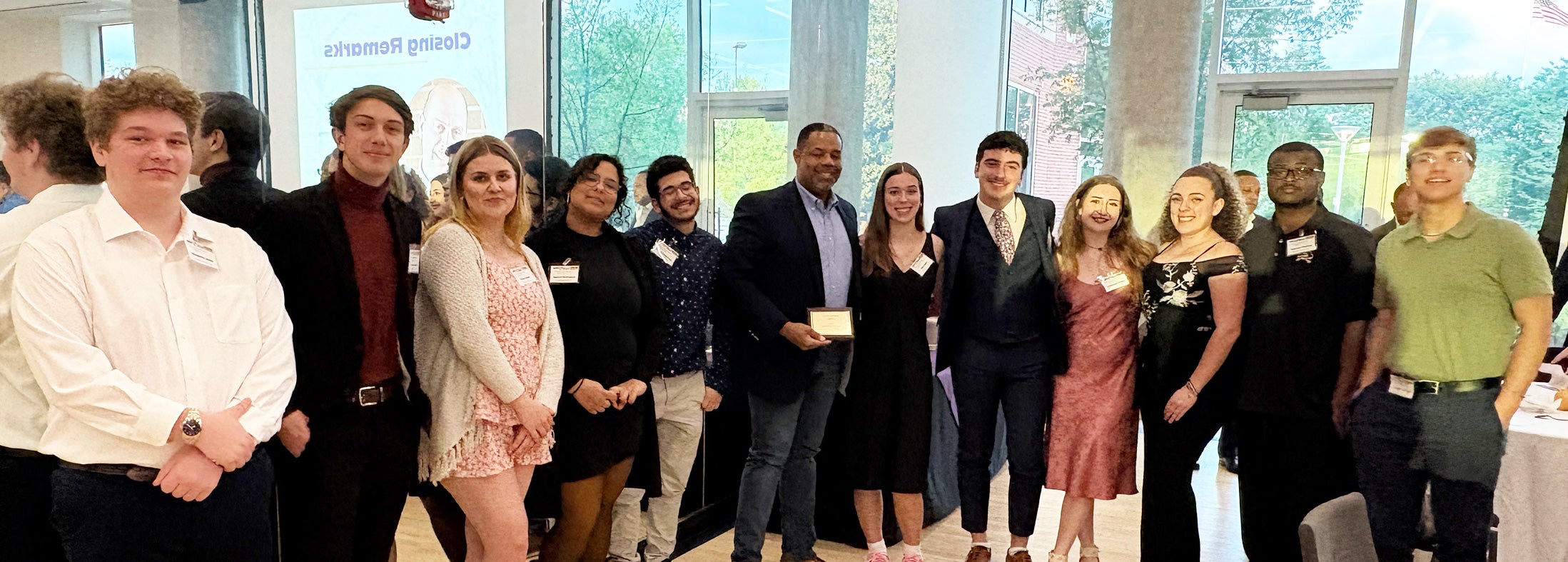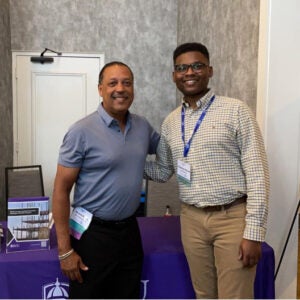Planner-in-Residence
Since its inception in 2018, East Carolina University’s Community and Regional Planning program has welcomed six Planners-in-Residence (PiRs): Merrill Flood, James Rhodes, AICP, Michelle Nance, FAICP, Lee Padrick, Angela Richter, and Ken Graves. These experienced professionals maintain full-time positions in the field while teaching, offering students direct exposure to current planning practices.
The Planning Accreditation Board (PAB) recognized ECU’s PiR program as a Noteworthy Practice for Student Engagement in the Profession, stating that “PiRs serve as a critical connection to the professional planning community in eastern North Carolina, enhancing the Program’s relevance. … The value of the current PIRs extends beyond the classroom and includes mentoring and professional networking that provides a clear path to internship and employment opportunities.”
Over the years, PiRs have taught applied courses, such as Land Use Planning, Planning Studio, Practicum, and Legislative and Administrative Planning, as well as a General Education course that introduces non-majors to the real-world impact of the planning profession.
Read testimonials from recent graduates to learn how PiRs helped shape the foundation of their careers.
Cameron Brown and Merrill Flood (PiR) at a regional conference
“I loved the Planner-In-Residence aspect of my education with the planning department. Hearing directly from experienced individuals who have worked in planning for decades in the state added a valuable layer of substance to my learning. Their practical knowledge made me appreciate my education even more, as I could connect theoretical concepts to real-world applications. Unlike some courses that feel purely conceptual, it was refreshing to hear from well-known and highly respected planners about how things actually work at the street level.
Additionally, the connections and relationships I was able to build with these professionals were another significant benefit. The Planner-In-Residence faculty often went out of their way to support planning students, whether through job connections or mentorship. Their guidance and support were invaluable and truly made my experience special. Now, as a graduate student, I often miss the experience of being in the classroom with practitioners who deeply understand the administrative realities of planning.” – Cameron Brown (Class of 2024)
“The Planners in Residence (PiRs) are a staple in the ECU Planning Program and a welcome addition to the stellar faculty and staff within the program. Being taught and assessed by planners helped us as students to process the principles we learned in our theory classes and conceptualize how those principles apply to everyday planning. This balance between theory and application made the curriculum really come to life! Even as students, we could confidently speak about planning because we had a well-rounded understanding of its applications. This was extremely invaluable as we had a leg up in our interviews and eventual careers. To this day, I still receive kudos from colleagues since ECU is known for its strong planning program and the talent it produces.” – Leila Coe (Class of 2022)
“As a 2019 graduate of the Planning Program at East Carolina University (ECU), I will always advocate for participation in and support of the university and the Planning Program. In my senior year, Dr. Hur and the faculty launched the PiR track, which has played a pivotal role in my professional development. My first PiR professor was Merrill Flood, who I remain in contact with on a regular basis. Mr. Flood, a former City Administrator, provided me and my classmates with training and shared his wealth of professional experience in all things Planning and Local Government. One training that stood out to me was the “mock interviews.” Mr. Flood and the faculty facilitated interviews with experts in the planning and local government field, which required students to challenge their preparation, speaking skills, and knowledge of all aspects of planning. The experience and lessons learned from the mock interviews provided me with the tools to interview for and accept my first position soon after graduation with the City of Winston-Salem’s Planning Department. To this day, I’ve continued to grow professionally and have moved into a leadership role with the City of Winston-Salem. I still regularly draw on what I learned through my PiR experience.” – Samuel Hunter (Class of 2019)
“I firmly believe the Planner in Residence program at ECU is one of the best features of the Planning program. I found it very beneficial to be able to learn from seasoned professionals working locally in the planning field who could teach us about real-world examples of planning problems that they have faced. Having their experience greatly benefited me as a student, and I would highly recommend any student considering the ECU Planning program to take a look at how this program sets ECU apart. In particular, I learned from James Rhodes and Merrill Flood, both of whom I had the privilege of working with as a planning consultant after graduating.” – Christopher Normile (Class of 2022)

Halloween costume contest (Fall 2023) in PLAN1900
“This semester, I am taking a course on Sustainable Cities with Lee Padrick, and it has quickly become one of my favorite classes. Although I have never taken a planning course before, Mr. Padrick makes the subject both interesting and educational. He infuses every lesson with amazing energy, and even in quieter settings, he maintains a lively and optimistic environment that keeps the students engaged. His overwhelming passion inspires us to participate actively in a dynamic learning atmosphere.
What distinguishes Mr. Padrick as a teacher is his commitment to fostering critical thinking and broadening our perspectives. He goes above and beyond to ensure that we understand the lessons and develop our communication skills, which are essential in any field. Mr. Padrick’s ability to encourage critical thinking and active discussion is a key feature of his teaching style. At the beginning of each class, he introduces a new character or scenario related to the day’s topic. After prompting us to think about the character’s situation and potential outcomes, he invites the class to discuss solutions to the problem. This approach not only piques our curiosity but also challenges us to think critically and independently.
To further enhance our learning experience, Mr. Padrick has recently arranged for guest lecturers. For example, in a recent presentation on Urban Metabolism, we had the privilege of hearing from Dr. Steven Richter, who provided us with a comprehensive understanding of the environmental and resource flow aspects of cities. Additionally, Mid-East Commission Transportation Director Sam Singleton shared his practical knowledge on how urban planning projects are developed and executed, offering valuable insights into potential career paths. Overall, Mr. Padrick is an exceptional professor due to his dedication to education and his ability to connect classroom theory with real-world applications. His efforts not only expand our knowledge of sustainable cities but also encourage us to be inquisitive, think critically, and address the complex challenges of urban planning.” – Faith Walker, Junior, Design Major
“My name is Mary Archibald, and I am a recent graduate of East Carolina University. I have recently started working full-time at the Mid-East Commission, assisting with economic development in small towns in Eastern North Carolina. During my time at ECU, I had the pleasure of being taught by our Planner-in-Residence, Merrill Flood, and James Rhodes. Each of these professionals brought a unique perspective to their curriculum while being employed in a planning capacity full-time. While I appreciate our invaluable staff of highly educated professors and teachers, planners-in-residence are able to provide valuable insights through a practitioner’s point of view into the professional world of planning through real world experiences.
 James Rhodes, project manager and retired assistant county manager in Pitt County, who taught classes in Land Use Planning and Planning Legislation & Administration, taught the crucial aspect of planning from a government and policy perspective. He was great at honing our communication skills, both written and verbal. Much of our class revolved around reading real-world case studies and having engaging discussions around them. He drilled in us the importance of professionalism in writing and how even the little things, such as grammar, can have a large effect on your ability to communicate in a professional capacity. He was also overall an awesome person with a lot of experience who was not afraid to push you and make sure you did your readings.
James Rhodes, project manager and retired assistant county manager in Pitt County, who taught classes in Land Use Planning and Planning Legislation & Administration, taught the crucial aspect of planning from a government and policy perspective. He was great at honing our communication skills, both written and verbal. Much of our class revolved around reading real-world case studies and having engaging discussions around them. He drilled in us the importance of professionalism in writing and how even the little things, such as grammar, can have a large effect on your ability to communicate in a professional capacity. He was also overall an awesome person with a lot of experience who was not afraid to push you and make sure you did your readings.
Merrill Flood, Director of Millennial Campus Planning and Local Community Affairs, retired Director of Planning and Assistant City Manager of Greenville, was another example of an accomplished professional in the field of planning who made time for students at ECU. Mr. Flood taught arguably the most important classes for our curriculum: Planning Studio and Planning Practicum. These were the capstone classes of the degree and were required to graduate. They were also the most effort and time-consuming. Mr. Flood was always there to help us with our project and answer any questions we had. He was also great at “keeping it real” about the field, dispelling any misconceptions as well as the hardships he faced throughout his tenure as a planning professional. I was also lucky enough to work with him on my summer research project on affordable housing. I cannot express enough the knowledge he gave me during our time working together. He was very smart, he knew the ins and outs of the subject, and was able to explain them in terms I could understand and comprehend. He is a big picture guy, but does very well at explaining all the moving parts.
Overall, this Planner-in-Residence program is very valuable, especially in the department of planning. Since it is such a complex, multi-faceted degree and field, having those who work in the world of community development and planning really added to the experience of our educational journeys. Since graduating, I have been able to see the great value that these professionals added to my experience at ECU, and I will always be grateful for their ability to provide practical, real-world experiences as part of classroom instruction.” – Mary Archibald (Class of 2024)

